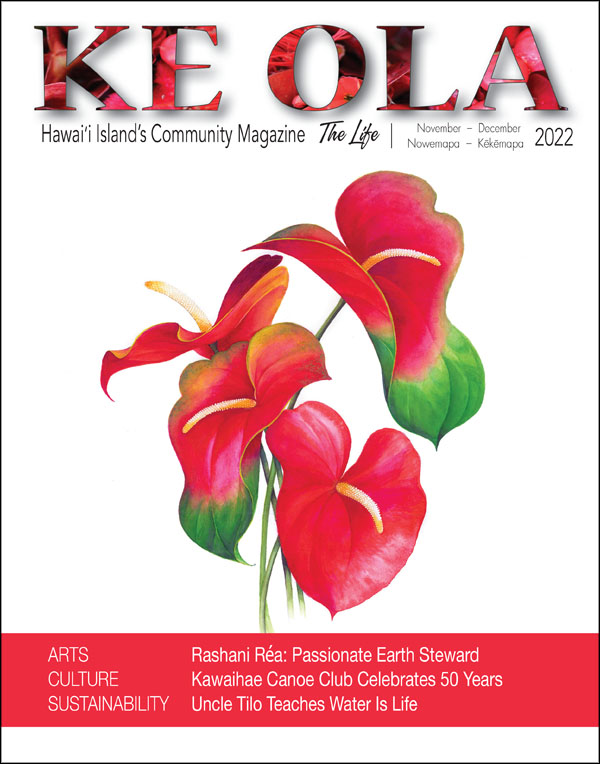
Backyard Chickens for Food Self-Sufficiency

By Rachel Laderman
When times get tough, people get chickens. It’s a practical way to gain more food security. A chicken coop in the yard also reduces the environmental footprint created by shipping eggs from the mainland’s large-scale, high-production poultry farms.
Islanders interested in food self-sufficiency look to the Polynesian wayfinders who settled in Hawai‘i around 1,000 years ago: what did they bring in their double-hulled canoes? Along with the “canoe plants” of coconuts, taro, sweet potato, and other valuable and versatile plants, the travelers brought dogs, pigs, and chickens (moa in Hawaiian—red jungle fowl). Although today’s domestic chickens are of a different lineage, it shows that chickens are a tried-and-true element of a food-producing Hawaiian homestead.
The number one benefit of backyard chickens is, of course, fresh, amazing eggs. But chickens also provide the services of a good gardener: they provide bug, coqui frog, and weed control, and fertilizer. If contained, the scratching of chickens can help you create or refresh garden areas when you rotate them into and out of the designated space. After years of providing eggs, if desired, chickens can then provide meat and broth. The entire life of a chicken is beneficial to a farm.

Hawai‘i is ideal for raising chickens. The warm temperature allows for more outside scavenging for food all year, and they have a shorter winter laying break. The islands host few predators—notably mongoose, rats, dogs, and cats—but this is mild compared to the onslaught of predators on the mainland, where chicken farmers must protect their flocks from foxes, coyotes, raccoons, large birds of prey, and snakes.
What is the disadvantage most people would point to in raising chickens (other than loud roosters)? Cleaning out the coop. As valuable as chicken manure is for the garden, it is no one’s favorite chore to muck out the smelly stuff from inside an enclosed roost. The potential to cause a nuisance odor is one of the reasons cited in zoning ordinances that restrict commercial chicken farming.
A style of animal-housing called Korean Natural Farming solves this dilemma and is perfect for raising chickens in Hawai‘i. The cornerstone of the design is to have a deep litter base of wood chips that is kept dry, with lots of air flow. Microorganisms living in the wood chips eat the poop and uric acid crystals (chicken’s version of urine, a whitish solid), and create self-cleaning, smell-free bedding for a coop.
Chicken Food Crunch
If chickens are so perfectly suited to life in Hawai‘i, why do we import the majority of eggs from the mainland? One big reason lies in the cost of feed. A few chickens can be raised on scraps and fruit to provide eggs, but for a bigger flock, chickens need a high-quality diet that is most economically supplied by grains currently only available from the mainland. Only a handful of farmers on the islands have found the balance needed to raise poultry successfully on a commercial scale.
Still, it is possible to reduce reliance on shipped feed. Small-scale chicken farmers have come up with many creative local foods such as utilizing moveable chicken tractors over pasture; sourcing excess coconuts, bananas, papayas, oil seed cake, and restaurant compost; and growing azolla (a nutritious water fern) and black soldier fly larvae (a non-nuisance fly grub that eats compost).

Extra Eggs?
Another benefit of raising chickens: you can raise your popularity, or a little cash, with your extra eggs. If you have too many eggs to give away, the next step is to sell eggs commercially to a grocery store or restaurant. On Hawai‘i Island, this means getting a permit from the Health Department, which requires washing and packing eggs in a commercial kitchen, having a current food handlers license (online and free), and paying an annual $100 fee. Eggs must be in new containers—none of those used cartons that your friends are so happy to drop off—with Health Department approved labels.
No wonder local, especially organic, eggs are pricey in Hawai‘i! But for the small farmer or gardener, it’s not the ton of cash pouring in, it’s the multiple benefits of healthy, tasty eggs; fertilizer, bug, and weed control; and the satisfaction of adding to neighborhood food security—a real consideration on an island. ❖
All photos courtesy of Rachel Laderman
Rachel Laderman, Lynker Sustainable Pacific Program



